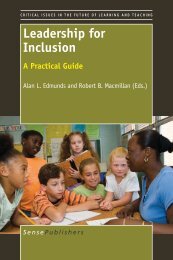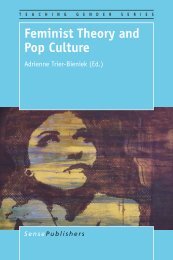EDITORS’ PREFACEHence <strong>learning</strong> is seen as a capacity to discern <strong>and</strong> focus on the critical aspects ofa concept or practice. In this case the <strong>threshold</strong> concept of opportunity cost becamethe object of <strong>learning</strong> whose critical features would need to be discerned <strong>and</strong>understood. The study also sought to measure variation in the extent to whichpupils demonstrated evidence of a subliminal or preliminal state of underst<strong>and</strong>ing.The former relates to the learner’s awareness <strong>and</strong> underst<strong>and</strong>ing of an underlyinggame or episteme – a ‘way of knowing’ – which may be a crucial determinant ofprogression (epistemological or ontological) within a conceptual domain. The latterconcerns how a <strong>threshold</strong> concept initially ‘comes into view’ (i.e. is initiallyperceived or apprehended), <strong>and</strong> the mindset with which it might be approached orwithdrawn from. According to the authors, those experienced in the manners ofreasoning <strong>and</strong> justifying customary to economics are likely, in reaching a rationaldecision, to take into account both benefits <strong>and</strong> costs. Significantly ‘they focus onboth the option chosen as well as the highest-valued option forgone at the sametime’. This was not the case with the Secondary 3 pupils however:most of the pupils interviewed seem only to have some innate grasp of theallocation of preference or benefit part, <strong>and</strong> they thus focus only on theoption chosen, taking for granted or ignoring the sacrifice or cost involved inchoice making. Even though some pupils may have a sense of cost, what theyfocus on is the monetary cost involved in getting the chosen option, ratherthan the opportunity cost of getting the chosen option.At one extreme, pupils failed to underst<strong>and</strong> questioning related to the notionsof ‘choice’ <strong>and</strong> ‘opportunity cost’ <strong>and</strong> could not demonstrate coherent ways ofreasoning. At the other extreme a few were:conscious of an embedded, consistent way of rationalising the phenomenon,although without the language to formalise it. They have developed animplicit way of using the concept of ‘opportunity cost’ to make sense of theworld through the scenarios <strong>and</strong> they seemed to be ‘thinking like aneconomist’ without being aware of it.For these few pupils some notion of choice or opportunity cost seemed to havecome into view, suggesting the possibility of their already having reached a preliminalstage. Still others frequently changed their minds whilst discussing the samescenario, indicating perhaps oscillation between sub- <strong>and</strong> preliminal modes ofvariation, or between an economic way of underst<strong>and</strong>ing <strong>and</strong> a lay person’s way ofunderst<strong>and</strong>ing. Occasionally students demonstrated an intuitive <strong>and</strong> quite sophisticated,economic way of reasoning.In seeking to establish a ‘transformative pedagogy’ the authors propose targetingthe transformation of pupils’ ways of thinking <strong>and</strong> reasoning. This requires a priorascertaining of pupils’ original, intuitive <strong>and</strong> normal ‘ways of knowing’ <strong>and</strong> anunderst<strong>and</strong>ing on the part of their teachers of the variation in ‘how pupils initiallyperceive, apprehend, conceptualise or experience the <strong>threshold</strong> concept in theabsence of any formalised knowledge of the concept itself’. This crucialxxxv
LAND ET ALknowledge will, in turn, the authors argue, ‘inform an underst<strong>and</strong>ing of where <strong>and</strong>why pupils may find themselves in “stuck places” on their <strong>learning</strong> trajectory’. Italso helps identify the critical features of pupils’ initial different ways of apprehendingphenomena that act as proxies for <strong>threshold</strong> <strong>concepts</strong>, <strong>and</strong> these mayinvolve both cognitive <strong>and</strong> ontological shifts. This then can open up the possibility,in both secondary <strong>and</strong> higher education, of genuinely transformative <strong>learning</strong>designs that can aid learners in their transition from naive or intuitive underst<strong>and</strong>ingsof economic phenomena to the more sophisticated ways of reasoning <strong>and</strong>practising normal to the community of practice.A further interesting migration of <strong>threshold</strong> theory, in this case from educationto social science, <strong>and</strong> an equally interesting ontological shift, can be found inDagmar Kutsar <strong>and</strong> Anita Kärner’s exploration, from a <strong>threshold</strong> <strong>concepts</strong>perspective, of societal transitions in post-communist Estonia (Chapter 23). Theiraim is not only to ‘broaden the explanatory potential of the <strong>threshold</strong> <strong>concepts</strong>perspective of teaching <strong>and</strong> <strong>learning</strong> to examine societal transition processes insociety’ but also ‘to develop a cognitive <strong>learning</strong> exercise from the experiences ofstudents seeking new explanations, visions, <strong>and</strong> meanings of “the known”‘. Thisinvolves applying the lens of <strong>threshold</strong> theory to an entire society at a critical pointof political, social <strong>and</strong> economic transformation in the aftermath of the break-up ofthe Soviet state, with one political system having collapsed <strong>and</strong> being exchangedby another. In doing this society is examined as a <strong>learning</strong> <strong>and</strong> teaching environmentin itself. ‘The transitions are meaningful events’, the authors observe, ‘accompaniedby uncertainties, <strong>learning</strong> the new <strong>and</strong> changing identities <strong>and</strong> structures’. Duringthis period of social transformation, society is ‘overwhelmed by a liminal space –no longer what it was <strong>and</strong> not yet what it will be. The liminal space is sharedby the actors of transition, the institutions, groups <strong>and</strong> individuals all filled witha mixture of new <strong>and</strong> old cognitions, emotions, myths <strong>and</strong> behavioural patterns’.As was pointed out at the beginning of this section, an act of <strong>learning</strong> is an act ofidentity formation, but, as these authors emphasise:Learning in rapid societal changes does not have a clear curriculum <strong>and</strong> allthose involved are students. Meeting uncertainties <strong>and</strong> the ‘unknown’ leadsto new perceptions <strong>and</strong> (‘troublesome’) knowledge... Examining rapidsocietal transitions in a particular country from the <strong>threshold</strong> <strong>concepts</strong>perspective, feels like putting the social <strong>learning</strong> process under a magnifyingglass.The authors draw on Turner’s anthropological notion of liminality, as does <strong>threshold</strong>theory itself. In their view the entire population of Estonia entered a liminal state atthe time of the (peaceful) Singing Revolution. This was the historical moment, inTurnerian terms, of leaving the old <strong>and</strong> meeting the new, <strong>and</strong> when the population,the social actors, enter a liminal state of what Turner called a no-longer-not-yetstatus.The majority of these social actors, in the authors’ analysis, emerged intoa postliminal state of order at some point in the mid 1990s, with new (<strong>and</strong> stable)social <strong>and</strong> economic structures. But this did not apply to all sectors of Estoniansociety. Continuing the Turnerian analysis, the authors describe the formation ofxxxvi
- Page 1 and 2: EDUCATIONAL FUTURES: RETHINKING THE
- Page 3 and 4: EDUCATIONAL FUTURESRETHINKING THEOR
- Page 5 and 6: A C.I.P. record for this book is av
- Page 7 and 8: TABLE OF CONTENTS10. Threshold Conc
- Page 9 and 10: Pax Intrantibus Salus Exeuntibus. L
- Page 11 and 12: LAND ET ALstudents experience diffi
- Page 13 and 14: LAND ET ALModePreliminalLiminalPost
- Page 15 and 16: LAND ET AL(Barker, 1991, p.184). Th
- Page 17 and 18: LAND ET ALvariations arising from t
- Page 19 and 20: LAND ET ALform of a model of concep
- Page 21 and 22: LAND ET ALQuestions of intersection
- Page 24 and 25: EDITORS’ PREFACEstudents bring to
- Page 26 and 27: EDITORS’ PREFACEconcepts in the f
- Page 28 and 29: EDITORS’ PREFACEIn the final illu
- Page 30 and 31: EDITORS’ PREFACEhence becomes a n
- Page 32 and 33: EDITORS’ PREFACElearning. This th
- Page 34 and 35: EDITORS’ PREFACEa lens or ‘way
- Page 38 and 39: EDITORS’ PREFACEthe Communitas, w
- Page 40 and 41: EDITORS’ PREFACEBuilding on these
- Page 42 and 43: EDITORS’ PREFACECousin, G. (2009)
- Page 44 and 45: DAVID PERKINSFOREWORDEntrance…and
- Page 46: FOREWORDMeyer, J.H.F., Land, R. & D
- Page 50 and 51: JULIE A. TIMMERMANS1. CHANGING OUR
- Page 52 and 53: CHANGING OUR MINDSKegan’s (1982)
- Page 54 and 55: CHANGING OUR MINDSKegan describes e
- Page 56 and 57: CHANGING OUR MINDSIn fact, Kegan an
- Page 58 and 59: CHANGING OUR MINDSat the epistemolo
- Page 60 and 61: CHANGING OUR MINDSMight a learner r
- Page 62 and 63: CHANGING OUR MINDSreveals an additi
- Page 64 and 65: CHANGING OUR MINDSBendixen, L. D.,
- Page 66: CHANGING OUR MINDSSibbett, C., & Th
- Page 69 and 70: SCHWARTZMANScholarship in liminalit
- Page 71 and 72: SCHWARTZMANTC: the entityThe term T
- Page 73 and 74: SCHWARTZMANA resource for teaching
- Page 75 and 76: SCHWARTZMANunprecedented to attract
- Page 77 and 78: SCHWARTZMANspectrum of scholarship
- Page 79 and 80: SCHWARTZMANrupture and phenomenolog
- Page 81 and 82: SCHWARTZMANfield(s) of one’s cons
- Page 83 and 84: SCHWARTZMAN36DATA: PARTICULARS GIVI
- Page 85 and 86: SCHWARTZMANchallenge than interpret
- Page 87 and 88:
SCHWARTZMANStrategies for Teaching:
- Page 89 and 90:
SCHWARTZMANThey are redefined here
- Page 91:
SCHWARTZMANLoder, J. (1981). The tr




